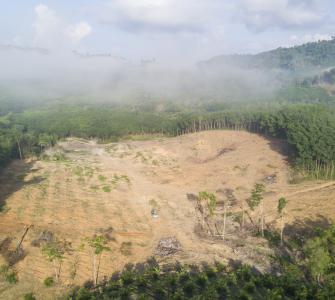Conservation Strategy Fund (CSF) Brazil, in partnership with the Open Society Justice Initiative (OSJI), aimed to present an economic valuation of the impacts resulting from the conversion of native vegetation to cattle ranching pasture in an area of the Brazilian Legal Amazon. We created an interactive web-based economic tool similar to our landmark Mining Impacts Calculator, entitled the “Deforestation Impacts Calculator”, which considers a wide array of damages and offers a final monetary estimate and additional resources. This tool enables companies to adjust their vigilance plan and fulfill requirements by repairing the damage caused by its deforestation activities in the Brazilian Amazon.
________________________________________________
The Amazon forest is our world’s best defense against the climate crisis as a carbon sink, climate regulator, and habitat for unique biodiversity. As a globally significant natural resource, the protection of the Amazon is critical, and the largest portions of the forest - those in Brazil - are facing increasing risk of deforestation every year. One of the greatest threats to the native vegetation in the Amazon is the conversion of forests into pasture areas for cattle ranching.
According to Salomão et al. (2021) 75% of deforested areas in undesignated public forests present in the biome are converted into pasture. In addition to the exploitation of public lands, the study by West et al. (2022) also reveals that illegal ranching occurs in protected areas and Indigenous Lands, violating the rights of these peoples over their territory and destroying valuable natural resources for local and global populations.
Despite its destructive tendencies, the cattle ranching industry is one of the main economic activities in Brazil, and is run by only a few very powerful companies. According to ABIEC (2022), Brazil is the second largest producer of beef in the world, with almost 196 million heads of cattle and only a few distribution companies controlling the Brazilian meat market. A significant portion of the cattle produced by these large Brazilian companies and purchased by international supermarket chains are grazed in illegal areas.
For years, IBAMA (the Brazilian Institute of Environment and Renewable Natural Resources, a federal agency under the Ministry of Environment) is fining companies for purchasing cattle from illegally deforested areas in the Legal Amazon states, in a national effort to reinforce international prohibition policies, such as the new European legislation to trace the origin of meat from deforested or non deforested areas. Companies that engage with such producers as a supplier must monitor their activities and prove to be in accordance with their own legal and socio-environmental commitments. To properly monitor supplier activities, a valuation study must factor in many environmental, social, and land ownership impacts. The impacts from this industry must then be translated into a monetary estimate for the businesses to address in the form of fines or compensation.
Conservation Strategy Fund (CSF) Brazil, in partnership with the Open Society Justice Initiative (OSJI), aimed to present an economic valuation of the impacts resulting from the conversion of native vegetation to cattle ranching pasture in an area of the Brazilian Legal Amazon region. This enables companies to adjust their vigilance plans and fulfill requirements by repairing the damage caused by deforestation activities.
The analysis, the “Deforestation Impacts Calculator”, considers a wide array of damages usually included in litigation, such as erosion of the land and loss of carbon capture. A web-based tool similar to our landmark Mining Impacts Calculator offers a final monetary estimate of the cost of deforestation considering geographic differences and potential socio-environmental impacts in each area. It can then be used as a way to better estimate fines for destructive activities in the region, and will help Brazilian government officials to discourage future deforestation and promote the implementation of sustainable agriculture practices.
According to Raquel Alves, IBAMA's Environmental Restoration Coordinator:
The Deforestation Impacts Calculator helps us to thoroughly assess deforestation's impacts, providing IBAMA a solid foundation for administrative processes and civil actions.
By monitoring the impacts of deforestation caused by economic activities, our goal is to contribute to the overall conservation of the Amazon rainforest. Future updates to the Deforestation Impacts Calculator aim to expand its applicability to other regions and biomes, broadening its impact on conservation efforts.
Go to our calculators hub and discover all CSF's free tools to support decision-making.
Photo: Shutterstock.com/ Rich Carey
(1) Salomão, C. S. C.; Stabile, M. C. C.; Souza, L.; Alencar, A.; Castro, I.; Guyot, C.; Moutinho, P. (2021). Amazônia em Chamas - Desmatamento, Fogo e Pecuária em Terras Públicas. Nota Técnica Outubro de 2021 - nº 8. Instituto de Pesquisa Ambiental da Amazônia (IPAM).
(2) West, T. A., Rausch, L., Munger, J., & Gibbs, H. K. (2022). Protected areas still used to produce Brazil's cattle. Conservation Letters, e12916.

